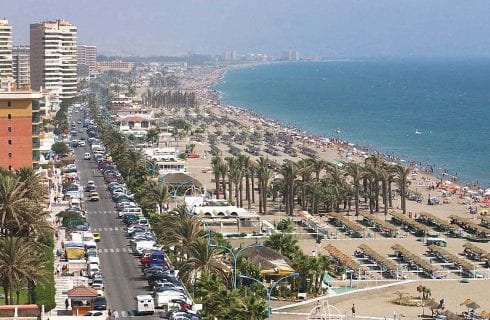THEY say you don’t choose the Camino de Santiago. The 1,200-year-old Camino chooses you. Why else would a 49-year-old woman who has never walked over a mile in her life before, consider doing it?
To this day I cannot tell you what made me decide to plan a 760-kilometre walk from one side of Spain to the other with twelve kilos on my back.
I remember picking up a second hand copy of Michener’s Iberia in which he wrote: “In the blazing summer of 1966 my pilgrimage along the Way of St. James began at a spot south of Pamplona on a bare and lonely plain marked only by dusty weeds.” It was hardly inspiring to a middle-aged agnostic.
Until then I knew nothing about St. James and how his dead and decapitated body was said to have been brought to the coast of Galicia in the first century in a stone boat without a rudder.
Nothing about how a tomb had been discovered in a miraculous way by Pelayo, the hermit, who saw lights and heard angelic voices. And certainly nothing about Priscillian the bishop of Avila, who some claim occupies the tomb in the cathedral – what an irony if it is true.
What I did know, however, was that I could expect to stay in refugios (or refuges, high up in the mountains) at little or no cost. I also knew I was likely to get blisters or even tendonitis, and I knew that as a ‘pilgrim’ I would have to get over my usual preference for my own company and learn to mix with walkers from all over the world.
But most of all, I knew that I was scared stiff having not prepared at all.
What I hadn’t counted on was that my backpack, which had seemed so reasonable back home, soon seemed to weigh a ton. As I took off from Pamplona bus station it pulled on my shoulders, sagged on my waist, and bruised my arm. It didn’t bode well.
Then again, my first night in a refuge wasn’t fabulous either. It resembled a refugee shelter more than anything else.
There were strapping-looking young men limping with bloodied toes and Amazonian women who looked as though they likely carried Swiss-army knives between their teeth.
I lay on the bottom bunk trying not to hear the 9:14 to Paddington blissfully asleep on the bunk above and thought: “What the hell am I doing here?”
But as the days passed I got more into it. I had taken the decision to walk alone and after three days I had got over the first stiffness and soreness.
I had made little progress in socialising with my fellow pilgrims most of whom seemed to be Brazilians, who commandeered the kitchens and cooked delicious garlicky-smelling dishes, but were not over friendly.
She introduced herself as Andrea, from Germany and disappeared into the bathroom. A few minutes she emerged brandishing an aerosol can. “Tracy! They have hairspray!”
I wondered what I was going to get out of my remaining five weeks to go.
By the time I got to Villafranca de Montjardin, about four days into my journey, I was resigned to learning about the Camino on my own.
I was delighted to be shown a room and settled down to a selfish nap, until in walked a woman in her 30s with untidy hair pushed back in a red scarf. My spirits dropped.
She introduced herself as Andrea, from Germany and disappeared into the bathroom. A few minutes she emerged brandishing an aerosol can. “Tracy! They have hairspray!”
Soon, Andrea began to turf things out of her rucksack. She produced a bottle of Gio perfume. “Hey!” I said, and fished out an identical bottle from my own.
“Ah!” said my newfound friend. “We are pilgrims second, but women first!”
Things were never quite the same after that and by the time we arrived in Santiago, we were a family. Thirteen pilgrims from eight countries, speaking nine languages with English as our only way of communication for the most part.
We were a social unit, a psychology experiment, a reality TV show, and were as fond of each other as we might have been if we had known one another all our lives.
One of the people I met was a priest. Actually I should explain. He was a medical doctor, who taught psychology at a university in Salt Lake City, Utah.
A former Mormon he had moved to the Gnostic church, where he had since become a minister. We talked for hours about religion and he explained how Gnosticism came about following the discovery of some parchments in the Egyptian desert in the 1940s.
Then one day he suddenly dropped into the conversation that St James was unlikely to have even been buried in the cathedral where we were headed.
I was far from thrilled to hear this. After all why the blazes were so many people walking 26 kilometers a day in the rain, mud, and blistering heat for!
He said the person more likely to be buried in the cathedral was Priscillian, a 4th century bishop who had a vast following in northern Spain at the time.
Priscillian, it seems, had been arrested and charged with heresy and witchcraft, and was one of the first people to be executed by the Inquisition’ 900 years before the word ‘Spanish’ became attached to it.
It was a name which simply wouldn’t go away. He so interested me, Priscillian became the subject of my recent book: Pilgrimage to Heresy: Don’t Believe Everything They Tell You.
Last year, over 150,000 walkers took the Camino to Santiago. The most popular by far is the Camino Frances, so-called because most routes begin in France and converge near Pamplona.But there are others.
This year, so taken by my first adventure a decade ago, I walked the Camino Portuguese from Oporto to Santiago: a “mere” 240 kilometers, but then I am 10 years older.
This was a different Pilgrimage, a lazy stroll gathering information, and flowers for my hat: a more “spiritual” one in which I practiced what the Camino has taught me over the years: to realise that “once in a lifetime” may mean just that and that we should never take for granted the wonders of everyday.
What are our reasons for walking? Most people simply don’t know. Jack Hitt, in his very funny book Off the Road described it as “to find out my reason for walking”.
Pilgrims come back year after year. For many it is almost an addiction.
Next year for the Xacabeo (or Jubilee) – which comes whenever St James’ day, July 25, falls on a Sunday – at least a quarter of a million people are expected.
Where they are going to sleep, heaven knows. Maybe St. James can work one of his miracles.
Either way, new routes are opening up all the time and the chances are you don’t have to go to the Pyrenees, or Lisbon, or Sevilla to begin. It’s just as likely you can walk out of your front door, or it will be soon if the folks at the Pilgrimage-to-Santiago.com forum have anything to do with it.
As to what you need to take etc., I will let others fill you in on that.
There are practical sites everywhere from Canada to Korea. One thing you do need to take is a desire to live a simple life, to be aware of every gift which comes your way (the Camino is known for providing what you need; I have experienced this myself often), and an openness to devote yourself to one single goal: putting one foot in front of the other.
One last word of warning, don’t think about “doing the Camino” if you are not interested in changing your life’s perspective. Once the Camino chooses you, you’ll never be quite the same again.
Tracy Saunders is the author of Pilgrimage to Heresy/Peregrinos de la Herejía: Don’t Believe Everything They Tell You. See her website at www.pilgrimagetoheresy.com, and her blog at www.pilgrimagetoheresy.blogspot.com








